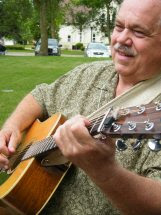Lynn and I have been members of the Minnesota Bluegrass and Old Time Music Association (MBOTMA) for over 15 years and a few years ago, became a MBOTMA 'member' band. When we first joined, my main interest was bluegrass: in the early 90's we took a bluegrass jam class offered by Brian Wicklund and Kevin Barnes, then members of Stoney Lonesome. But over the years I became more interested in 'old time' music and as a duo, Lynn and I focus mostly on the old-time tradition. MBOTMA has 3 categories for band: Bluegrass, Old-time and Related - we registered as an old-time band, mostly because most of the new songs we were learning - Carter Family, Delmore Brothers, etc - were firmly in the 'old-time' tradition.
Something I read in the Old-Time Herald a few months back got me to thinking about what it means to perform music in the 'old-time' tradition. It was a review of a CD and the reviewer was bemoaning the fact that the music didn't sound exactly like some performance she'd heard on a 78 - she said something more or less like 'I suppose folk must make new recordings' (some day I'll find that review and put the exact quotes here). When we were at Lanesboro I was also in a couple conversations with people bemoaning the fact that so-and-so was 'beatifying' the sound in order to make it more palatable. So I did a little checking around to find out how 'old time' music was defined. Two links seem to do a good job of defining it:
http://www.oldtimemusic.com/otdef.html
http://mikeseeger.info/html/oldtime.html
I like this comment from the old time music link:
Resonant in meaning and methodology, `old time music' had been the heartbeat of Anglo-Celtic Southern America for many generations. By the time it became a marketing label which celebrated its own quaintness, its days were numbered. The technology which enables us to savor Fiddlin' John Carson 70 years after his heyday also heralded the demise of the charmed circle of oral tradition and relative isolation which had nurtured old time music since the coming of the South's first Anglo-Celtic settlers.
Thus the direct record of old time music can be thought of as the 78 recordings of the 1920's and 1930's - however, this is just a snapshot of music that had been played and evolved throughout the 18th,19th and early 20th century: for the most part, these recordings were commercial - they were made to sell. Field recordings may give a better insight into non-commercial music, but the earliest date from the 20th century on as well. Thus to state categorically that old time music done in this small window is the only way to do it seems extreme: I am willing to grant a great deal more lee-way to how old-time music should sound and be performed.
Mike Seeger's comments were originally published about 10 years ago in Bluegrass Unlimited and is addressed to bluegrass fans: he gives a number of recordings of old-time music that would give a bluegrass fan a sense of the 'roots' of bluegrass. His comment that 'speaks to me' is:
I suspect that many of us play this older style music for some of the same reasons that most bluegrass musicians play bluegrass, because we like it and it fits us. We can think of all kinds of reasons such as "I was raised with it," "I like its sound," "I like to be able to play the music myself or with friends without plugging in," and I can add "it's timeless, meaningful and I value its continuity with the past." All of those and more fit me. I can talk on and on about reasons for liking old-time and bluegrass music but really it all boils down to "it just suits me."
Although I didn't really set out to be an old-time musician, I'm finding more and more that "it just suits me". One final quote from Kenny Jackson's Web site sums it up for me for now:
Old-time music is now found in American families from diverse backgrounds, and while it recalls bygone times and places, it's also very much a living, contemporary music. Most of my friends play and sing it, and I can't think of old-time music without also thinking of those good friends whom I'll meet up with at fiddlers conventions and festivals, or in kitchens and on front porches, going late into the night leaning into long, wild fiddle tunes, and singing tragic old ballads, heart songs, banjo songs, blues.
Old-time music may have a name that would make it seem something from bygone eras—and yes, it does invoke spirits of the past—but it continues to be the most exciting, relevent, and in-the-moment musical experience of many people's lives. And I'm glad to be one of them!
http://www.kenejackson.com/
(more in a later post I'm sure)
Monday, July 2, 2007
Subscribe to:
Post Comments (Atom)

No comments:
Post a Comment